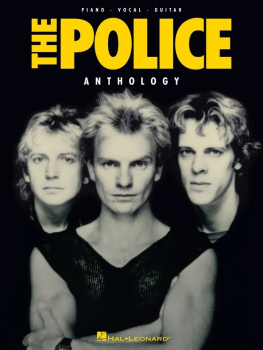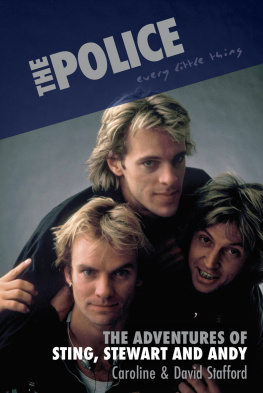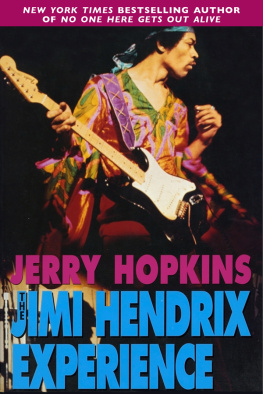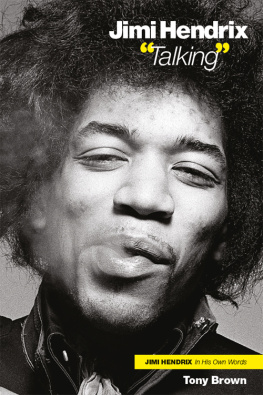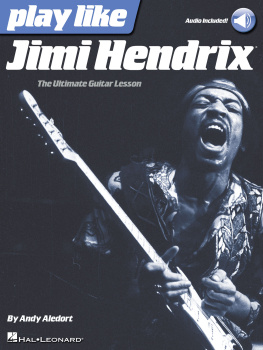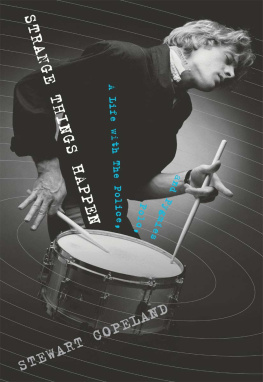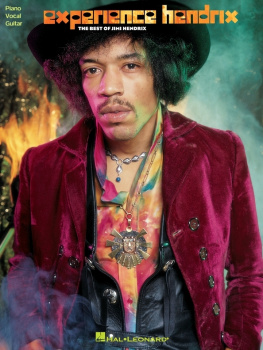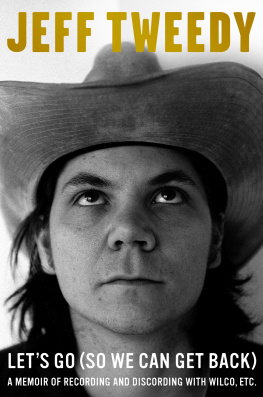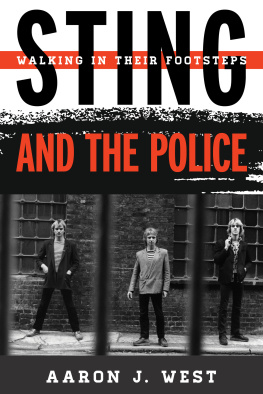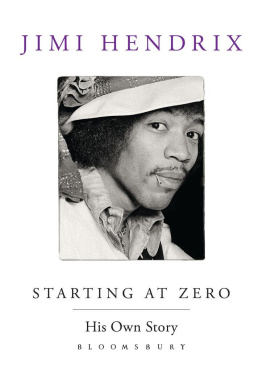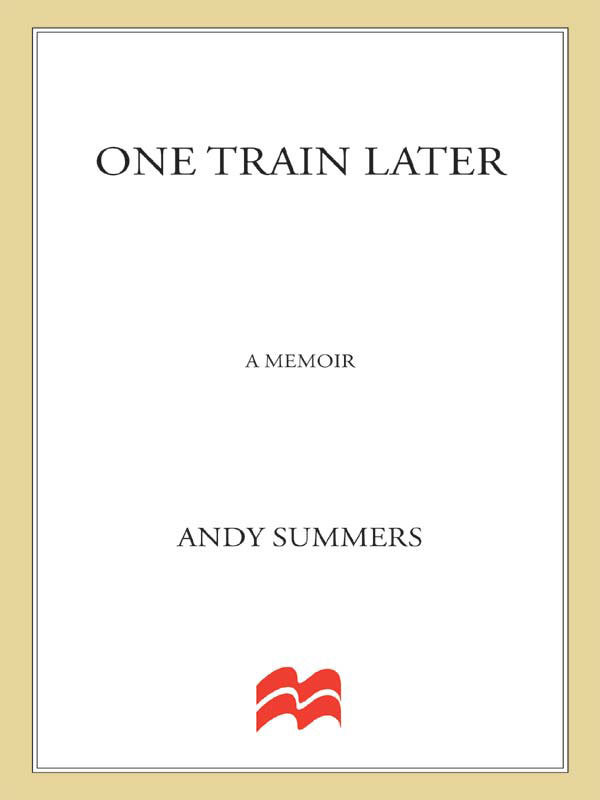
ONE TRAIN LATER
Authors Note: This is a memoir, a recollection, a remembrance.
A few times and names of peripheral events and players from my youth have been changed.
The essence of the memoir and the direct quotes within are true to my memory.
THOMAS DUNNE BOOKS.
An imprint of St. Martins Press.
ONE TRAIN LATER. Copyright 2006 by Andy Summers. Foreword copyright 2006 by The Edge. All rights reserved. Printed in the United States of America. No part of this book may be used or reproduced in any manner whatsoever without written permission except in the case of brief quotations embodied in critical articles or reviews. For information, address St. Martins Press, 175 Fifth Avenue, New York, N.Y. 10010.
www.thomasdunnebooks.com
www.stmartins.com
Photo on , Arturo Encinas.
ISBN-13: 978-0-312-35914-0
ISBN-10: 0-312-35914-4
First Edition: September 2006
10 9 8 7 6 5 4 3 2 1
Contents
ALSO BY ANDY SUMMERS
Light Strings
Throb
For Richard
Acknowledgments
To Kate, my wife and partner, for her love, support, and unerring instinct for the truth. To our children, Layla, Mo, and Anton, who complete it all.
To my parents, Jean and Maurice, for being my parents and believing.
My brothers, Richard and Tony, and my sister, Monica, for the life shared.
To Sting and Stewart Copeland for the dream.
To Kim Turner, Miles Copeland, and Ian Copeland for being on the path with us.
To Zoot Money, with whom I began this adventure and who remains a touchstone.
To friend and poet Cathy Colman, who gave me invaluable editorial advice throughout the writing process.
To friend and writer Brian Cinadr, who read the manuscript more than once and reminded me of parts of my history that I had forgotten.
To my agent, Susan Schulman, for her counsel, wisdom, and staying power.
To John Parsley, my editor at Thomas Dunne Books, for nudging me down the path to resolution.
To Dennis Smith for making it all possible.
To all those along the way for support, friendship, and performing so well in the play: Ralph Gibson, Mary Jane Marcasiano, Jenny Fabian, Robert Wyatt, Kevin Coyne, Anthony and Martine Moore, Eric Burdon, Vic Garbarini, Morleigh Steinberg and The Edge, Stevo Glendenning, Christopher Burley, Bradley Bambarger, Robin Lane, Kit Lane, Norman Moore, Adrian and Lynn Boot, Chris Salewicz, Ben Verdery, The Shants, John Etheridge, Victor Biglione, Luiz Paulo Asuncio, Watal Asanuma, Coco Asanuma, Lenny Riggio, Louis Lepore, Robert Fripp, Jill Furmanosky, Lawrence Impey, Frane Lessac, Eberhard and Steffi Schoener, Karen Grey, Randall Kremer, Sonja Kristina, Jerome Lapperousaz, Nazir Jairazbhoy, Dittany Lang, Jodi Peckman, Jeff Seitz, Danny Quatrochi, Tarn Fairgreaves, Cecila Miniucchi, Jeffrey Coulter, Gerry Casale, Phil Sutcliffe sorry if I left anyone out.
Foreword
by The Edge
How to become a rock star? Plug in and wait for inspiration. That seems to have been the secret to Andy Summerss success in the music business, or so it would seem based on his autobiography.
In the age of pop idol, when the order of the day is to commodify yourself to success, this book will hopefully be a welcome counterbalance. Full of anecdotes of near misses and false starts, the books overarching theme is of a man blown by some supernatural wind along a road not of his choosing but of his calling: music, for better or worse, his mistress, his seducer, his lifeline.
And with every blind alley, every setback, there comes the increasing sense that the journey is the most important thing.
Starting, as his story does, with his first experiments with skiffle, taking us through his involvement in the U.K. blues explosion, and on into the high sixties of the Beatles and the Stones, no other apprenticeship could possibly have prepared Andy for the world-dominating success of the Police, just one of the bands that can claim him as a member, but the one that will surely be remembered by history.
It was during his time with the Police that I first met Andy. As a member of U2, then a junior band about to open for them at their 1982 Gateshead Stadium gig, I was somewhat intimidated by the sight of the three blond icons as they came bounding into the lobby of the hotel where we had all gathered to await transport to the stadium. There was between Andy and his bandmates, Sting and Stewart Copeland, this unmistakable sense of chemistry. They were not just a great band, they were a real band.
We had in fact opened for the Police once beforeacross the Irish Sea in our homeland at the first ever outdoor concert at Slane Castlebut in 1981 such was the gulf between us that we never actually met.
Time passed, and in 1986 by some twist of fate U2 ended up playing at an Amnesty International Conspiracy of Hope concert at New Jerseys Giants Stadium with the Police after they had decided to call it a day. It was a major occasion for many different reasons. I certainly will never forget the moment when Andy handed me his guitar in front of the 65,000 capacity crowd at the end of the Polices final set, for U2 to play out the last song of the event. There was more than a little symbolism in that handing over of instruments.
That Andy absorbed the success of the Police, as he did all the other ups and downs he experienced along the road, without losing a sense of himself, his passion for, and his belief in the sacred and life-changing qualities of music is a testimony to the purity of his motivation as a musician, songwriter, and artist. May we be lucky enough to see his like again.
BOOK ONE
BRIDGEHAMPTON, AUGUST 18, 1983
Its over.
I wake, my eyes fill with morning light. The bandits over. Shea Stadium tonight; this is it. The soft dream voice confirms with a knife-edge what I already know.
Like a raft lashed together with anything at hand, we have managed to float this far without disintegrating. With strange chemistry and fragile nexus, we raised the flimsy sail of chanceand still we havent sunk. But thisthe concert tonightis the signifier of a final destination, the abandoning of the craft. As the summer waves fall on the beach in the close distance and fans in Police shirts and scarves and badges and armfuls of vinyl records line up outside of Shea Stadium, I clasp my hands behind my head and stare at the stuccoed ceiling.
The facts: We have held the number one album spot on the Billboard charts for four months without a break. We have had the number one single in the United States for eight weeks. We are a phenomenon. We have countless number one records around the world. We are a multimillion-dollar industry. We are three. All this and yet it seems like only a flickering five minutes ago that we were pushing a broken van back through the streets of London after a gig we played to no one. Tonight we play out the fantasy of millions.
This is the Cinderella moment; the hands are close to midnight, the spoked sun wheeling out of the sky.
I stare across the room into the mirror over the mantel, where the early light creates a soft chiaroscuro. Sting has been muttering about how this is the time to stop, to get off, to quit at the high point of the curve. He has repeated this as if it is a fait accompli, but instead of negating this idea or working out some slower form of dissolution or telling him to fuck off, I have murmured a sort of assent as if its some kind of engaging concept, an interesting idea. But on the gut level its devastating. I knew that this was inevitable, that it was always in the script; the question was when it would surface. Is it possible to walk away from this poppy, this opiated success, this deadly nightshade of stardom?
Next page

